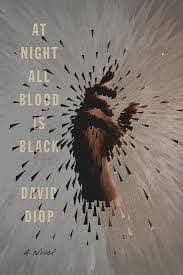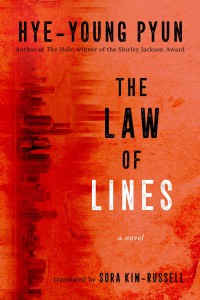In Asymptote’s most recent Winter Issue, translator Emily Graham brought Linda Maria Baros’s visceral and enigmatic poem “Aucun homme ne t’a défendue” into English as “No man has defended you.” This “transitional” poem comes from Baros’s collection La nageuse désossée. Légendes métropolitaines (The Deboned Swimmer: Metropolitan Legends), which combines a folkloric atmosphere and militaristic ideas to create a resonant call to action. In the following interview, Asymptote contributor Marina Dora Martino speaks with Emily Graham on her experience bringing the “allure” of Baros’s poetry into English.
Marina Dora Martino (MDM): “No man has defended you” is a powerful stand-alone piece, but I am curious about how it relates to the rest of The Deboned Swimmer. Can you tell us a bit more about where the poem stands in the collection?
Emily Graham (EG): “No man has defended you” is the final poem in “Tarmac,” the section that opens The Deboned Swimmer. The collection is broken up into several of these sections, all named after areas or details of an urban landscape, like “Walls,” “Roofs,” “Underground.” Each section ends with an italicised piece that is at once part of the section and apart, a moment of transition. And this is what “No man has defended you” is, though the poet decided to lose the italics once the poem was taken out of context. Each of these end-of-section transitional poems goes back to the figure of the enigmatic swimmer. In these poems, there is often a sense of strife and oppression, but there is also a yearning. These swimmers seem to have something that the narrator craves and wants to be a part of, and each italicised poem seems to add to her pursuit in reaching it. “No man has defended you” is very interesting in this sense, as the contrast between this undercurrent of violence and the narrator’s admiration for the swimmers is particularly strong.
MDM: In your translator’s note, you talk about how there is no gender-specific word for “swimmer” in English, but the nageuses in Baros’s French original are definitely marked as female. How important is it for the swimmers in this poem to be identified as women?
EG: It is very important for the poet—the swimmer figure is explicitly gendered from the very title, La nageuse désossée. There being no English equivalent, it was a little hard to navigate this gender-specific word, and I really had to take it poem by poem and line by line. For instance, I was planning to translate “les vestiaires des nageuses” as “women’s locker room,” operating a choice on which side to bring forward in that line, but when I spoke to Baros about it, she was adamant that the swimmers had to be present in the poem, so I decided on the non-gendered “swimmer’s locker room.” It preserves a certain cohesion of sense and sound, and I thought, better to have a line that sounds right and has a little side note than to mess up with the rhythm and the imagery!











